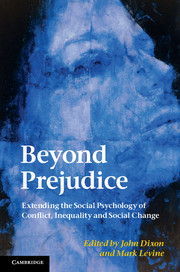Book contents
- Frontmatter
- Contents
- Figures
- Tables
- Contributors
- Acknowledgements
- Introduction
- Part I Beyond prejudice
- Part II Prejudice and social change revisited
- 11 Models of social change in social psychology: collective action or prejudice reduction? Conflict or harmony?
- 12 From attitudes to (in)action: the darker side of ‘we’
- 13 Contact and social change in an ongoing asymmetrical conflict: four social-psychological models of reconciliation-aimed planned encounters between Israeli Jews and Palestinians
- 14 From prejudice to collective action
- Conclusions and future directions
- Index
- References
Conclusions and future directions
the nature, significance and inherent limitations of the concept of prejudice in social psychology
from Part II - Prejudice and social change revisited
Published online by Cambridge University Press: 05 June 2012
- Frontmatter
- Contents
- Figures
- Tables
- Contributors
- Acknowledgements
- Introduction
- Part I Beyond prejudice
- Part II Prejudice and social change revisited
- 11 Models of social change in social psychology: collective action or prejudice reduction? Conflict or harmony?
- 12 From attitudes to (in)action: the darker side of ‘we’
- 13 Contact and social change in an ongoing asymmetrical conflict: four social-psychological models of reconciliation-aimed planned encounters between Israeli Jews and Palestinians
- 14 From prejudice to collective action
- Conclusions and future directions
- Index
- References
Summary
Susan Fiske (2002) recently took stock of the progress made by social psychologists in tackling what she evocatively labelled the ‘problem of the century’. She noted that although ‘much remains to be learned’, ‘much is known’ already (p. 128). Reading her paper, one is struck by how the image of the bigot in social psychology has shifted over the long history of prejudice research. Along with the blatant, simple, hot, direct biases of ‘ill-intentioned extremists’, psychologists nowadays study the more subtle, complex, cool, implicit biases of ‘aversive racists’. One is struck, too, by the methodological ingenuity of recent work in the field, which is increasingly exploiting techniques drawn from cognitive psychology and neuroscience. Above all, one is struck by the enduring commitment among prejudice researchers to the ideal of balancing advocacy and scholarship, to changing as well as understanding society. The political spirit that accompanied Samelson’s (1978) ‘abrupt reversal’ is alive and well.
Our aim in this book has not been to devalue the many contributions made by the social psychology of prejudice. Rather, we have sought to evaluate some foundational assumptions of prejudice research, notably its individualistic orientation, its emphasis on the role of irrational cognition and emotional antipathy in intergroup relations, and its commitment to a prejudice reduction model of social change. By necessity, our coverage has been selective, and we not had space to discuss a number of other important challenges to the prejudice problematic; for example, challenges arising from developments in the field of evolutionary psychology (e.g. Neuberg and Cottrell, 2006).
- Type
- Chapter
- Information
- Beyond PrejudiceExtending the Social Psychology of Conflict, Inequality and Social Change, pp. 304 - 331Publisher: Cambridge University PressPrint publication year: 2012
References
- 4
- Cited by



